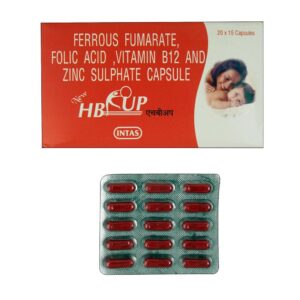MULTIVITAMINS + FERROUS SUCINATE + FOLIC ACID VITAMIN B12 SELENIU
Multivitamins: Multivitamins are a combination of essential vitamins and minerals that are commonly used as dietary supplements. They are used to ensure adequate intake of vitamins and minerals that may be lacking in the diet, or in conditions where the body’s requirements are increased, such as during pregnancy, breastfeeding, or illness.
The mechanism of action of multivitamins is based on their role as cofactors in various enzymatic reactions throughout the body. Vitamins and minerals are essential for normal cell function, growth, and development. They help in maintaining the health of the skin, hair, and nails, supporting the immune system, and aiding in the conversion of food into energy.
The dose and specific composition of multivitamins can vary depending on the brand and formulation. They are available in various forms, including tablets, capsules, gummies, and liquids. The recommended dose is typically one tablet or capsule per day, taken with a meal to enhance absorption.
While multivitamins are generally considered safe when taken as directed, they can potentially cause side effects if taken in excessive amounts. Common side effects include nausea, stomach upset, diarrhea, and a yellowish discoloration of urine due to the presence of high levels of B vitamins. Some individuals may experience allergic reactions to certain ingredients present in the multivitamin formulation.
It is important to note that multivitamins should not be used as a substitute for a balanced diet. They are intended to supplement the diet and should not replace the consumption of nutrient-rich foods. Before starting any new dietary supplement, it is advisable to consult with a healthcare professional to ensure it is suitable for individual needs and to avoid any potential interactions with other medications.
Ferrous Sucinate: Drug: Ferrous Sucinate
Use: Ferrous Sucinate is an iron supplement used to treat or prevent iron deficiency anemia resulting from inadequate iron intake, malabsorption, or excessive iron loss.
Mechanism of Action: Ferrous Sucinate works by providing the body with the essential mineral iron, which is required for the production of hemoglobin, a molecule that carries oxygen in the blood. It replenishes the depleted iron stores and increases the production of red blood cells.
Dose: The dose of Ferrous Sucinate depends on the severity of the iron deficiency and the individual’s age, weight, and overall health. The typical recommended dose for adults is 100-200 mg of elemental iron per day, divided into 2-3 doses. The dose for children varies based on age and weight and is usually prescribed by a healthcare professional.
Side Effects: Common side effects of Ferrous Sucinate include constipation, nausea, stomach upset, diarrhea, dark-colored stools, and stomach cramps. In some cases, it may cause allergic reactions such as rash, itching, or swelling. If any severe or persistent side effects occur, it is important to seek medical attention immediately.
Note: Ferrous Sucinate should not be taken by individuals with known iron overload disorders (e.g., hemochromatosis) or excessive iron accumulation. It is also important to follow the recommended dosage and not exceed the stated dosage without consulting a healthcare professional.
Folic Acid Vitamin B12 Seleniu: Folic Acid Vitamin B12 Selenium is a combination drug that contains three essential nutrients: folic acid, vitamin B12, and selenium.
Folic acid is a synthetic form of folate, a B-vitamin that helps the body produce and maintain new cells. It is commonly used as a supplement during pregnancy to prevent neural tube defects in the developing fetus. Folic acid is also used to treat or prevent folic acid deficiency and certain types of anemia.
Vitamin B12, also known as cobalamin, is another B-vitamin that plays a crucial role in the formation of red blood cells and DNA synthesis. It is used to treat vitamin B12 deficiency, pernicious anemia, and other conditions associated with vitamin B12 deficiency.
Selenium is a trace element that is essential for various biological functions, including metabolism and thyroid hormone synthesis. It acts as an antioxidant, helping to protect cells from damage caused by free radicals.
The mechanism of action of this combination drug is based on the individual actions of each component. Folic acid is converted into its active form, which is necessary for the production of DNA and red blood cells. Vitamin B12 acts as a cofactor in various enzymatic reactions, specifically those involved in DNA synthesis and red blood cell production. Selenium, as an antioxidant, helps to neutralize harmful free radicals and may support overall cellular health.
The dose of Folic Acid Vitamin B12 Selenium may vary depending on the specific condition being treated and individual factors. It is usually taken orally, either as a tablet or capsule, and is often prescribed by a healthcare professional.
Possible side effects of this combination drug may include nausea, diarrhea, loss of appetite, and abdominal cramps. Rarely, allergic reactions may occur. It is important to consult a healthcare professional or read the product label for more detailed information on the specific formulation of Folic Acid Vitamin B12 Selenium and its potential side effects.
It is important to note that this is a brief description and you should consult a healthcare professional or read the specific product label for comprehensive information on the use, dosage, and side effects of Folic Acid Vitamin B12 Selenium.

